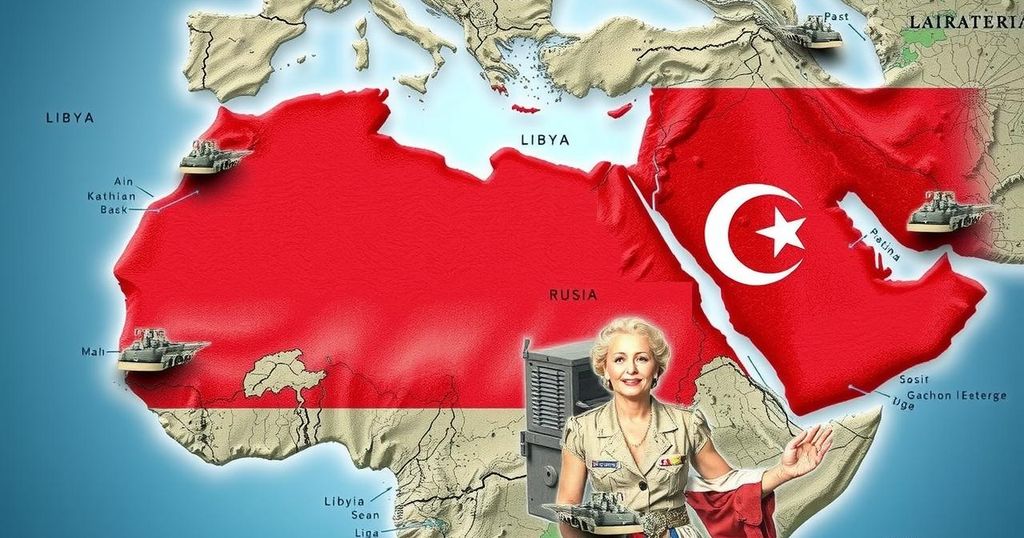World news
AFP, AFRICA, AHMED AL - SHARAA, ALL, ASIA, BASHAR AL - ASSAD, CENTRAL AFRICAN REPUBLIC, EUROPE/ASIA, GOVERNMENT OF NATIONAL UNITY, HARCHAOUI, INTERNATIONAL RELATIONS, JA, KHALIFA HAFTAR, LIBYA, MILITARY, MOROCCO, RUSI, RUSI THINK TANK, RUSSIA, SAHEL, SANCTIONS, SYRIA, WAR
Fatima Khan
0 Comments
Russia Shifts Focus from Syria to Libya as Strategic Launchpad in Africa
Russia is redirecting its strategic interests from Syria to Libya, viewing the latter as a critical base for expanding its influence in Africa. The Kremlin backs Khalifa Haftar against the Tripoli government amidst significant changes in Syrian leadership, indicating a reshuffling of its military resources and priorities. Despite the opportunities, Russia faces challenges due to Libya’s fractious political climate and the involvement of various international actors.
The Kremlin is redirecting its strategic focus from Syria to Libya as a potential new launchpad for its influence in Africa, particularly following the upheaval caused by Bashar al-Assad’s diminished hold on power. Experts suggest that Russia’s military foothold in Syria has been jeopardized, prompting a reassessment of its operations in the region and a shift towards exploiting Libya’s tumultuous political landscape. Russian mercenaries are currently backing Khalifa Haftar, the military commander in eastern Libya, against the UN-recognized Government of National Unity based in Tripoli.
Recent information indicates an increase in Russian military resources sent to Libya, with reports of transfers of advanced defense systems from Syria to Libya as tensions escalate in the region. Moscow appears to be concentrating its efforts on maintaining a continuous presence in Africa, albeit with the understanding that operating in Libya presents complex challenges compared to its previous engagements in Syria.
The ongoing conflict in Libya stems from the power vacuum created by the fall of Moamer Kadhafi in 2011, which has led to a bifurcated political landscape. Despite this entangled situation, Russia aims to exploit the chaos and its alliance with Haftar to establish a counterbalance to Western influences, particularly NATO’s presence in the region. However, the intricacies of Libyan politics, coupled with the involvement of other international players such as Turkey and the United States, may complicate Russia’s ambitions. These dynamics suggest that while Libya may present an opportunity for Moscow, the pathway to success will be fraught with significant diplomatic and operational hurdles.
Following the decline of Bashar al-Assad’s authority, the Kremlin finds itself at a crossroads regarding its strategic objectives in the Mediterranean and African regions. Syria has served as a crucial military base for Russian operations, but with a new leadership emerging, there is a perceived necessity for Russia to seek alternative locations for establishing its influence. Libya, with its ongoing political instability and armed factions, provides a fertile ground for Russian engagement, particularly through its support of local military leaders like Khalifa Haftar.
In summary, Russia’s shifting focus from Syria to Libya exemplifies its adaptive strategies in the face of geopolitical changes. While the Kremlin endeavors to solidify its influence in Africa through military support of local conflicts, the complex web of alliances and internal divisions in Libya presents a formidable challenge. As Moscow navigates this intricate landscape, the potential for success remains uncertain amid competing interests from other nations and the precarious nature of Libyan politics.
Original Source: www.france24.com




Post Comment